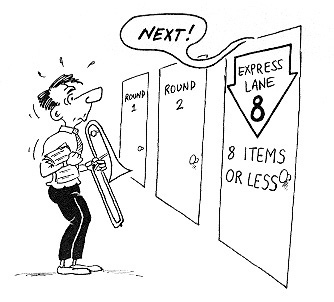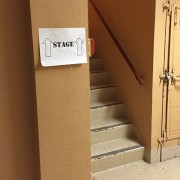Taking Auditions for “The Experience”
As you probably know, auditions are the strangest things. They can turn the strongest players into a fumbling pile of nerves, the cleanest spiccato into a lovely martelé, and the steadiest scherzo into a Stockhausen pointillist etude.
Locking yourself in a practice room doesn’t solve this problem. Being able to nail a passage 20 times in a row with no pressure doesn’t fully prepare you for when you have to do it just one time for all the marbles.
I believe my students when they say, “It was better at home,” the problem is that this is called the “Performing Arts” not the “Practice Room Arts.” If you want to stay locked in a room for the rest of your life creating art, consider becoming a painter.
So the problem then is how do you prepare for an audition outside of the practice room? (I’m assuming you are still practicing for your audition–for which there is no substitute)
There are two seemingly conflicting schools of thought that I have heard regarding the solution to the audition blues, and I’d like to explore them a little more.
The first says:
“Take as many auditions as you can for ‘The Experience’”
And the second one says:
“Don’t take an audition unless you feel confident that you could win it.”
School of thought No. 1
My knee-jerk reaction to the first statement is, “Exactly what experience are you trying to get?” If you show up at the New York Philharmonic audition and you don’t really think you have a shot at winning it, it’s going to be a bad experience. Sure you may learn a few things about the procedures and hear some really good players, but you probably won’t advance, and that hurts. It may not hurt too much right away, (since you knew going in you probably wouldn’t advance, right?) but if you keep repeating this, it can create an unhealthy habit. I’ll explain:
The biggest problem with this mindset is that it promotes protecting yourself from the hurt of rejection by never being fully prepared.
Rejection may not be that big of a deal a couple times in a row, but what about after 10 auditions? 20 auditions? What if you would have won audition #31, but stopped after #30 because you were too burnt out from all the previous losses.
If you went into an audition and played the absolute best you could, and were still rejected it would be completely demoralizing: “My very best isn’t good enough.” So we give ourselves an excuse and say, “I didn’t play my best” or “I’m really so much better than I just played” in an effort to console our self-esteem after being turned down.
What’s really crazy is that sometimes we want to make this excuse believable, and so we purposely don’t prepare 100% so that it’s actually true when it comes time to say it.
The positive side about this advice to take auditions for the experience is that it does help if you know what to expect at an audition. There is a lot of unusual protocol at auditions, and not being thrown off your game because of these is important. Some of the things you may not experience in your practice room are:
· Being forced to warm up in the mass warm up room (a.k.a. the “Shark Tank”)
· Being herded around from the shark tank, to a private practice room, to the holding room, to backstage.
· Walking out on stage on the little strip of carpet and playing to a screen.
· Not talking to the panel, but whispering to the proctor.
Any one of these things would be strange on their own. If you’ve never experienced these things and were already a little nervous, they could really derail your audition.
School of thought No. 2
The advice on the other end of the spectrum says you should only take auditions if you know you could win it.
The dangerous thought progression with this adage is that we start to place way too much pressure on ourselves to actually win the audition. Because we know that we could win the audition, that means that we should win the audition. And when we don’t win, the rejection is especially painful since we feel like we were expected to win.
The key word in this sentence is could, and it should not be confused with will.
It’s very good advice to prepare yourself to the highest level you can, and be confident that you are playing everything flawlessly. But the reality is that even perfect playing doesn’t mean you will win an audition.
This advice is trying to save you from the inevitable and unnecessary rejection when you decide to go to an audition “just to see what happens.” However,
The problem with this mindset is that it can become easy to bail out of actually going to an audition because we are afraid that we couldn’t win it anyways.
They say “you’ll lose 100% of the auditions you never go to” so at some point your practicing has to be enough. You must be present to win.
Some closing thoughts
As you can see, neither advice is simply black or white. They are also not mutually exclusive, and I actually recommend elements from both ideas.
My advice if you’re starting out would be to simulate the audition environment as best and as many times as you can before actually taking one. Once you have done that, take a couple local auditions-anything within a few hours drive to get one under your belt. You don’t have to commit to joining the orchestra if you win it, but take it seriously.
Do consider reducing the total number of auditions you have to go to in your life, by taking each one seriously, and only taking ones you are completely prepared to win.
Go into it expecting to win it, but if it doesn’t go well, try to see rejection as part of the learning experience. Figure out exactly what went wrong, have a beer, and then work on fixing it for next time.
Be well, and practice well












Comments are closed.